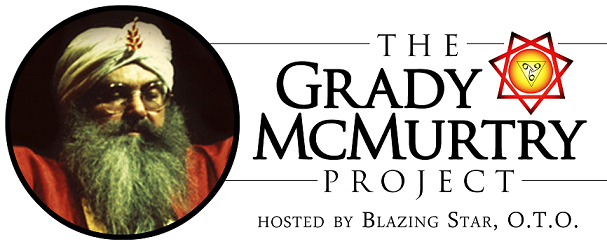NOTE: During the early years of Grady’s military service in the Second World War his access to magical texts was quite limited. As a student in Pasadena, getting involved with the O.T.O. through Jack Parsons, his practice had been to borrow books, use libraries, and take notes as he read. He had little spending money, and the books he needed most were not readily available for sale in America then anyway. While being shipped around the country for boot camp and various instructional programs, and then to officer training school, he could not have carried much of a library even had he owned one. But an advantage of the army was easy access to typewriters, and this apparently enabled Grady to copy out and organize some of his previous notes, along with texts he was trying to memorize (such as the priest’s speeches in the gnostic mass), and even a number of favorite poems, articles, and essays (mostly taken from magazines). Clipped into a sheaf of now-tattered legal-size pages with a cardboard cover, Grady called it his “Lesebuch” (book of gatherings) and carried it around to pour over at odd moments in his bunk, or off duty. He seems to have taken it abroad when he eventually shipped out, since a few later entries were squeezed in on blank ends of some of the pages. One of these — written with a blue fountain pen — is the following note. Although prefaced with Grady’s own brief critique of the novel, the list of “real characters” almost certainly contains information he obtained directly from Crowley during one of his visits. Very likely most of the notes are simply transcribed from annotations in Crowley’s own copy of the book, although a few comments seem to reflect the Beast’s spoken explanations.
A Note on Moonchild
by Grady L. McMurtry
MOONCHILD — Aleister Crowley
The Mandrake Press, 41 Museum St., W.C. London, 1929.
Cyril Grey (Crowley), experimenting with magick, takes a girl to Naples to magically attract the spirit of Luna to incarnation in an embryo. Succeeds despite machinations of Big Bad “Black Lodge,” ends by dropping the whole affair, becoming hero of British Army, and accepting the way of the Tao. Fails as a novel for many reasons.
Real characters in story:
Lavinia King (Isadora Duncan)
Lisa de Giuffria (Mary d’Este)
Amy Brough ( )
Lavinia’s brother (Raymond Duncan)
Blaustein (Will Rothenstein)
Monet-Knott (Hener-Skene)
Miss Badger (Gwendolen Otter)
Akbar Pasha (Elias Pasha)
Countess Helena Mottich (Tomschyk: Hon. Mrs. Everard Fielding)
Sister Cybele (Leila Waddell)
Lord Antony Bowling (Hon. Everard Fielding)
Duke of Flint (Earl of Denbigh)
Mahathera Phang (Allan Bennett — Frater Iehi Aour, later Bhikkho — & the Sayadaw — Ananda Metteya)
Wake Morningside (Hereward Carrington)
Dr. Balloch (Dr. Berriage)
S.R.M.D. — Douglas (S. Liddell Mathers, “Count MacGregor of Glenstrae”)
wife of Douglas (Moira, “painted very badly”)
famous professor at the Sorbonne (Prof. Henri Bergson)
Arthwait (Arthur Edward Waite)
Abdul Bey (Veli Bey, son of Elias Pasha; actually a rascally adventurer)
Gates (W. B. Yeats)
Roger Blunt (Roy something — I suspect he was a manager of E. F.’s)
blackmailing articles (The Looking Glass, John Bull, etc.)
Dr. Victor Vesquit (Dr. W. Wynn Westcott, coroner, W. London)
Hampden Road (Camden Road)
Palladists (see A. E. Waite’s rubbish Devil Worship in France)
p. 178: special goat (the grimoirs say “cum que puella conabuerit”)
Cremers (brains behind Mabel Collins’ plot to “expose” H. P. Blavatsky;
some success)
p. 204: genuine (the Bible; New Testament)
p. 209: (the Phalles)
Butcher (Plummer)
“A. B.” (Annie Besant)
Mrs. Doughnut (Hereward Carrington’s #2 — or #3? — wife)
General Cripps (French)
Sir Edward (Grey)
chez Zizi (“Jaja”; Jane Cheron)
her English journalist (Walter Duranty)
Becasseux (Cailleux)
souls presented to Lisa (Georges Sand, Chopin, Joseph Smith, Ludwig II of Bavaria, Marie Antoinette, Byron, Tolstoi, Tschaikowsky, Kipling, T. H. Huxley, Strauss, Swinburne, Blake, Keats)
Simon Iff (Dr. Reuss?)
